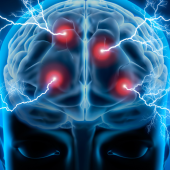Karolyn Gazella founded the Natural Medicine Journal in 1992 and has been writing about integrative health since then. Karolyn keeps us posted on important stories in integrative health every month.
Key Take-Aways
Breakthrough: Catching Eating Disorders Sooner
Eating disorders are among the most deadly mental health illnesses, second only to opioid overdose, which is an epidemic.
Eating disorders include anorexia nervosa, bulimia nervosa, binge eating disorder, as well as other feeding and eating disorders like pica and rumination disorder. Early diagnosis and intervention are absolutely critical.
Now Dr Gregory Hundemer, a researcher at Ottawa Hospital Research Institute has found that individuals who have an electrolyte imbalance are twice as likely to develop an eating disorder. Now practitioners can use a simple blood test to reveal who is most at risk to develop an eating disorder.
Learn more on the Natural Medicine Journal Podcast: Early Diagnosis of Eating Disorders: A conversation with researcher and professor Dr Gregory Hundemer, MD.
Nutritional Deficiencies and COVID-19 Severity
New information points to nutrient deficiencies increasing the risk of catching COVID and, more importantly, increasing the risk of severity of COVID.
A study that came out in December found that people who were deficient in vitamin D were more apt to have a positive COVID test.
In the December issue of the Natural Medicine Journal, Dr John Newstead commented on a new study that looked at vitamin D levels in terms of inflammatory markers, specifically C-reactive protein and white blood cell count.
The study found that in hospitalized COVID patients who were deficient in vitamin D, supplementation of 10,000 IU of vitamin D daily for nine days reduced their inflammatory markers significantly.
A 2021 study found that vitamin D and vitamin K deficiencies were correlated with more severe COVID, and another study found that glutathione deficiency was linked to more severe COVID.
Vitamin D Dosing Controversy Finally Explained
The controversy associated with vitamin D revolves around dosing. Now, a new study focusing on BMI has found that people who had a higher BMI body mass index were not getting the same benefit from the vitamin D supplements. This may explain why consensus around vitamin D dosing has been so elusive.
The study puts this on the radar of clinicians and may cause them to reevaluate how they're dosing vitamin D. This also indicates that there may be a need for more of an individualized dosing approach for people with a high BMI.
Lack Of Sleep Dehumanizes Society
A new study adds data to what we all already knew: lack of sleep makes you grumpy! Lack of sleep decreases the desire to help others, decreases the desire to contribute money to charitable organizations.
In fact, even one night of lack of sleep made people not want to help others the next day. It's a great example of how lack of sleep not only affects us, it affects how we interact with others, it affects us as a society.
Key Quote
"I had no idea that eating disorders were so common or so deadly. According to the American Association of Anorexia Nervosa and Associated Disorders in the United States, eating disorders are among the most deadly mental health illnesses, second only to opioid overdose, which is an epidemic. Furthermore, worldwide, every 52 minutes someone dies of an eating disorder. So not only are they common and becoming even more common, they're quite deadly."
Karolyn Gazella
===
The opinions expressed in this Nutramedica program are those of the guests and contributors. They do not necessarily reflect the opinions of Nutritional Fundamentals For Health Inc.
This video is intended for licensed or registered health professionals and students of health professions only. These statements have not been evaluated by the Food and Drug Administration. Information contained in these programs is not intended to diagnose, treat, cure, or prevent any disease.



